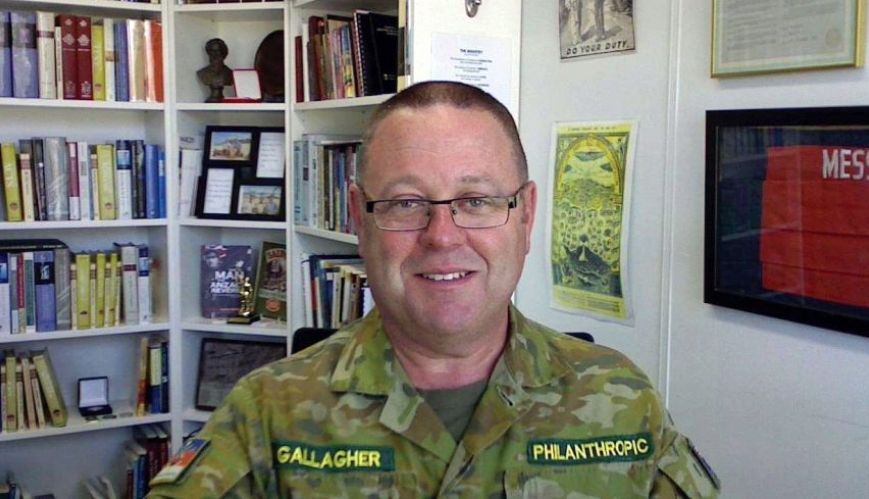Red Shield Defence Services - a friend to the diggers

Red Shield Defence Services - a friend to the diggers
7 November 2022
“Everyone, no matter their rank, no matter who they are, can come and have a chat with us,” says Brett Gallagher, head of The Salvation Army Red Shield Defence Services.
Brett Gallagher has been the Chief Commissioner of The Salvation Army Red Shield Defence Services for six years, administering a team of Salvos offering friendship and a listening ear in times of conflict. With Remembrance Day coming up on Friday, Others Online reporter Anthony Castle asked Brett about his role and the impact his team makes on Australia’s defence force personnel.
The Red Shield Defence Services have a whole team of philanthropic representatives currently supporting serving men and women every day. What does that look like out on the bases and in training areas?
Our team has four-wheel drives that take refreshments to soldiers and officers during their training activities. It’s a place where the service people can come and rest, and talk about what’s going on for them. It’s providing a vehicle that opens up conversation. What we do is similar to chaplaincy, but we’re providing a physical relief on base or out on the military training areas around the country, and we were based on a permanent rotation to the Middle East region. In many of our places on base, we have a ‘Hop-in’ centre for people to come and relax and for us to support them.
 One of the Salvation Army RSDS vehicles ‘on patrol’ at night.
One of the Salvation Army RSDS vehicles ‘on patrol’ at night.
What type of challenges do service men and women face? Is it always combat-related or does it come with the training environment?
Any of the normal challenges that people have in day-to-day life, we see in service men and women beside the truck, but amplified. They might be away for months, away for anniversaries or partners’ birthdays. There can be issues with alcohol and gambling, marriage and relationship breakdown. My team will be there, talking through those issues, working by providing welfare relief to families. If someone finds out about a veteran that’s homeless, our team can walk alongside them and try and help them to find the help they need.
We know that there are significant challenges that veterans face, with homelessness and mental health. What role does the team play regarding the wellbeing of veterans?
A veteran isn’t someone who has finished or returned from conflict necessarily, but someone who has served more than one day in defence. People still serving are veterans. The Salvation Army did a review for chaplaincy, recommending a more targeted approach to veterans. There are figures that say that men who are medically discharged are twice as likely as someone their age to attempt suicide. Women who are medically discharged are three times more likely than someone their age to attempt suicide.
“... we listen to veterans and try and connect them with services and supports that they need, so that some of the challenges they face may not seem as daunting.”
There is an amplification, an institutionalisation that can happen in defence, where people can’t make that bridge once they leave. For some young soldiers, they’ve never looked after themselves before. They’ve had three meals a day organised, then suddenly they have to make rent and utilities. They haven’t built the life skills since they entered as a 17-year-old. They go in as minors. It’s partly why we now have a royal commission into defence suicide.
Some people call veterans ‘the clinkers’, the old guys whose medals clink on Anzac Day or Remembrance Day. But we have ex-serving veterans in their 20s and 30s, who served in Iraq and Afghanistan. We didn’t always see young men from Vietnam; they often feel forgotten, like they went to a conflict that the country didn’t support. To also see forces pulled out of Afghanistan, and the country falls back to the way it was, veterans can ask, “why did I risk my life?” In all these situations, we listen to veterans and try and connect them with services and supports that they need, so that some of the challenges they face may not seem as daunting.
What can you do for people living with that kind of trauma, transitioning back to civilian life?
We think of ourselves as a friend to diggers. Everyone, no matter their rank, no matter who they are, can come and have a chat with us. For us, we talk about being a listening ear, someone who’s not part of the system. We dress in camouflage and are present on base, but we are there with them while not being part of defence services. I’ve talked with a soldier whose sergeant got stuck into them, listened and given them a coffee. I’ve had that same sergeant come and share his side of the story and the challenges that he’s facing and how he was feeling terrible about having to speak to the soldier in that manner. It’s just being there. Also knowing when to refer them to someone, when they are contemplating suicide, link them up with the system. We can walk them through what it means to invite other people in and keep them safe. We do all this over a cup of coffee, like a friend would.
Sit down with a good book and a cuppa tea

Cuppa tea Digger? by The Salvation Army Museum Manager Lindsay Cox will entertain and inform you, and lend insight into how people survive the frenzy, bloodlust, fatigue, trauma, boredom and carnage of war.
Subtitled ‘Salvos Serving In World War Two’, the book is a 25-year labour of love based largely on more than 180 oral histories of Diggers and Salvos’ philanthropic Red Shield War Services (RSWS) who were there ‘on the ground’, in Europe, Asia, the Pacific and the Middle East. That includes the last stop before the ‘Brisbane line’, the arm-wrestle with Japanese forces on the Kokoda Trail in Papua New Guinea.
The 240-page, hard-cover book comes with 300 brilliant photos, a knowledgeable foreword from General Sir Peter Cosgrove, and the writer’s insights into the costs of battle. To be launched in late November, it also accurately captures the intergenerational, courageous service that led Australians to fully embrace the Salvos as a fair dinkum mob worth supporting.
Cuppa tea, Digger? (by Salvo Publishing) is available from Sydney Salvationist Supplies (1800 634 209) or thetrade.salvos.org.au, and Melbourne Salvation Army Supplies (1800 100 018) or commerce.salvationarmy.org.au